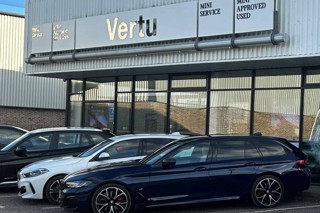Two statistics sum-up BMW's ill-fated attempt to make Rover the supporting brand it believed it needed to raise group car sales and become a global automotive force.
The German group has revealed it pumped £2.56bn into its British subsidiary and, after finally admitting defeat, sold it for £10.
For such a successful carmaker, blessed with sophisticated executives and as many advisers as it needed, BMW made a horrendous mistake.
Industry analysts and journalists with a feel for the motor industry were sceptical from the start. If BMW had been in the position to gain a marque like VW, it would have had a logical second-tier brand. Then it could have tackled the world market, targeting sectors with a chance of success.
But Rover – a good marque in its day – was no more than the survivor after the other British badges were binned. Its true value was seen when the hard-nosed ex-industry financial adventurers from venture capitalists Alchemy attempted a take-over. The only chance, they decided, was to focus on MG.
Now John Towers, a former Rover chief executive, is back in the chair, leading a team, headed by managing director Kevin Howe, trying to resurrect the company. At Geneva motor show, the company unveiled the Rover 75 Tourer and MG equivalents of that estate and the smaller models.
There are, though, positive signs. Analysts believe MG Rover could break even next year and in 2003 after losing around £100m this year. Some optimistic forecasts talk of a £75m profit in 2004 and £200m the following year.
Meanwhile, BMW reports it sold 822,181 cars last year and has the 4x4 X family to replace Land Rover sold to Ford. Mini goes on sale this year, 1 and 6 Series are coming and Rolls-Royce is wholly BMW-owned in 2003. BMW is bullish without Rover.
A fanfare to the day the balloon went up
Press day at the 1998 Birmingham motor show will stick in the minds of all who were there. BMW-owned Rover launched its latest saviour, the 75, in the morning with a fanfare played by the London Symphony Orchestra.
In the afternoon Bernd Pischetsrieder, then the boss of BMW, transformed the expected routine press conference into business theatre.
Under a sub heading 'the balloon goes up', the day is a pivotal moment in 'End of the road', a book about BMW/Rover by Chris Brady and Andrew Lorenz.
Dr Pischetsrieder said Rover was in crisis and that short-term actions were needed for the long-term good of the marque. “Talks are taking place with the British government about the whole problem,” he told journalists.
At the time, some thought it was a public relations gaffe but, like many events described in 'BMW and Rover – a brand too far', the book's sub-title, there was much more to it.
BMW executives were increasingly concerned about the strength of the pound which was damaging Rover's ability to sell overseas.
After he left BMW, Dr Pischetsrieder explained his motives. “I decided I needed to give this problem a sort of public background,” he is quoted in the book as saying. “It had to be on stage and not just behind stage to get things moving.”
He demanded cost cuts, productivity improvements and government aid. Only with all three in place would BMW proceed with the new Mini and R30, seen as a VW Golf rival.
Then came the crunch: “With these products, the future of Longbridge will be secure. Without them, there will be no plant. We have made good progress with Rover but it is not enough. The parameters under which we planned the next couple of years for Rover have changed.”
That can now be seen as the moment when BMW began to absorb the notion that its vision for Rover was destined to be a costly failure.
In the final quarter of 1998, BMW was hurtling toward losses of £600m for the year. The authors add: “In its Herculean effort to remake Rover, BMW had left its toughest and costliest tasks – both in plant and product – until last; the attempt to create a premium-priced, middle-market car that could compete with VW's Golf, and the complete overhaul of the sprawling hulk that was Longbridge.”
The book chronicles the absorbing saga in detail – the conflicts between BMW and Rover people and government ministers. Perhaps there will be a sequel about MG Rover's attempted rebuild.


















Login to comment
Comments
No comments have been made yet.